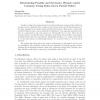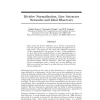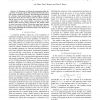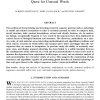73 search results - page 4 / 15 » Positivity of second order linear recurrent sequences |
122
click to vote
AAAI
2008
15 years 2 months ago
2008
Usually a voting rule requires agents to give their preferences as linear orders. However, in some cases it is impractical for an agent to give a linear order over all the alterna...
93
Voted
NIPS
1998
15 years 1 months ago
1998
Gain control by divisive inhibition, a.k.a. divisive normalization, has been proposed to be a general mechanism throughout the visual cortex. We explore in this study the statisti...
CDC
2008
IEEE
15 years 7 months ago
2008
IEEE
— In this paper we discuss the consensus problem for a network of dynamic agents with undirected information flow and random switching topologies. The switching is determined by...
106
click to vote
MP
2008
15 years 16 days ago
2008
Abstract. Two corrector-predictor interior point algorithms are proposed for solving monotone linear complementarity problems. The algorithms produce a sequence of iterates in the ...
92
Voted
RECOMB
2002
Springer
16 years 27 days ago
2002
Springer
The problem of characterizing and detecting recurrent sequence patterns such as substrings or motifs and related associations or rules is variously pursued in order to compress da...




